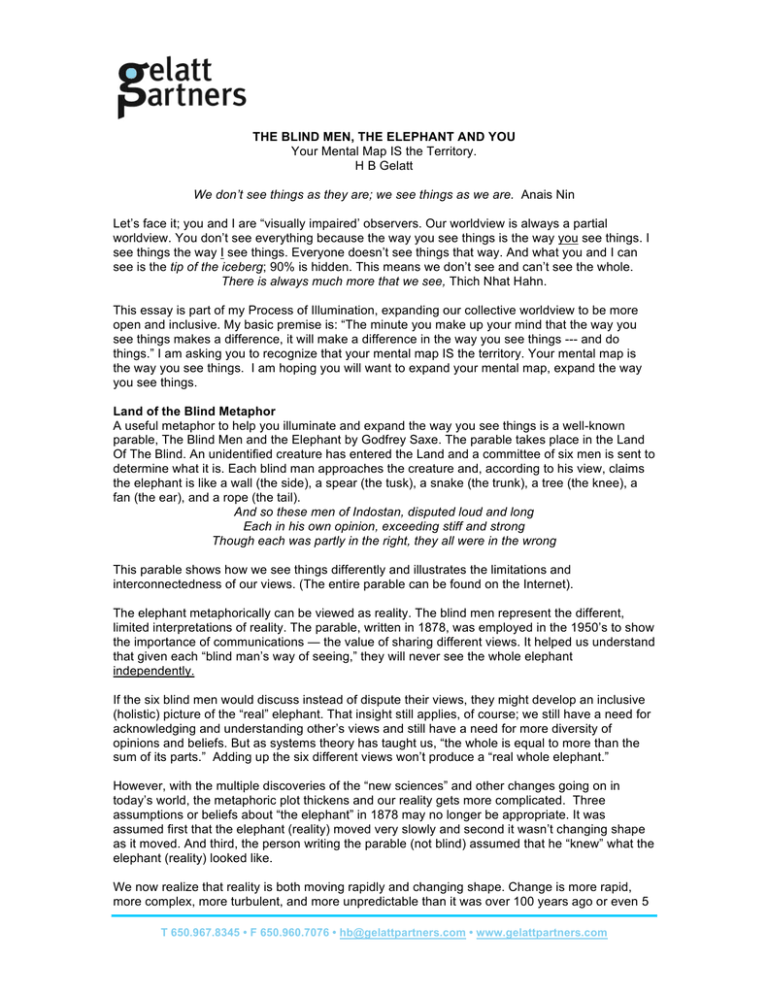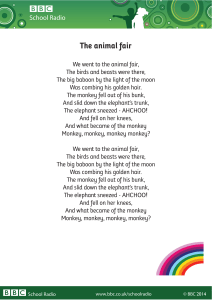The Blind Men, The Elephant and You
Anuncio

THE BLIND MEN, THE ELEPHANT AND YOU Your Mental Map IS the Territory. H B Gelatt We don’t see things as they are; we see things as we are. Anais Nin Let’s face it; you and I are “visually impaired’ observers. Our worldview is always a partial worldview. You don’t see everything because the way you see things is the way you see things. I see things the way I see things. Everyone doesn’t see things that way. And what you and I can see is the tip of the iceberg; 90% is hidden. This means we don’t see and can’t see the whole. There is always much more that we see, Thich Nhat Hahn. This essay is part of my Process of Illumination, expanding our collective worldview to be more open and inclusive. My basic premise is: “The minute you make up your mind that the way you see things makes a difference, it will make a difference in the way you see things --- and do things.” I am asking you to recognize that your mental map IS the territory. Your mental map is the way you see things. I am hoping you will want to expand your mental map, expand the way you see things. Land of the Blind Metaphor A useful metaphor to help you illuminate and expand the way you see things is a well-known parable, The Blind Men and the Elephant by Godfrey Saxe. The parable takes place in the Land Of The Blind. An unidentified creature has entered the Land and a committee of six men is sent to determine what it is. Each blind man approaches the creature and, according to his view, claims the elephant is like a wall (the side), a spear (the tusk), a snake (the trunk), a tree (the knee), a fan (the ear), and a rope (the tail). And so these men of Indostan, disputed loud and long Each in his own opinion, exceeding stiff and strong Though each was partly in the right, they all were in the wrong This parable shows how we see things differently and illustrates the limitations and interconnectedness of our views. (The entire parable can be found on the Internet). The elephant metaphorically can be viewed as reality. The blind men represent the different, limited interpretations of reality. The parable, written in 1878, was employed in the 1950’s to show the importance of communications — the value of sharing different views. It helped us understand that given each “blind man’s way of seeing,” they will never see the whole elephant independently. If the six blind men would discuss instead of dispute their views, they might develop an inclusive (holistic) picture of the “real” elephant. That insight still applies, of course; we still have a need for acknowledging and understanding other’s views and still have a need for more diversity of opinions and beliefs. But as systems theory has taught us, “the whole is equal to more than the sum of its parts.” Adding up the six different views won’t produce a “real whole elephant.” However, with the multiple discoveries of the “new sciences” and other changes going on in today’s world, the metaphoric plot thickens and our reality gets more complicated. Three assumptions or beliefs about “the elephant” in 1878 may no longer be appropriate. It was assumed first that the elephant (reality) moved very slowly and second it wasn’t changing shape as it moved. And third, the person writing the parable (not blind) assumed that he “knew” what the elephant (reality) looked like. We now realize that reality is both moving rapidly and changing shape. Change is more rapid, more complex, more turbulent, and more unpredictable than it was over 100 years ago or even 5 T 650.967.8345 • F 650.960.7076 • hb@gelattpartners.com • www.gelattpartners.com years ago. This moving and changing environment today is called “permanent white water.” Reality doesn’t remain the same and no one person really knows what reality looks like … because we cannot see the whole. Here is how to use the parable as an illumination method. See Yourself as One of the “Blind Men” In all visible things, there is a hidden wholeness. Thomas Merton I am proposing that you see yourself as a visually impaired observer---to metaphorically see yourself as one of the blind men observing the elephant. If the elephant (reality) is moving and changing, then you will need to keep moving and changing in order to keep “in touch” with reality. And if no one person really knows what the whole elephant looks like, then you must accept that your view is limited and you cannot see the whole by yourself. Actually metaphorically you are the elephant because you are always part of your reality. Chaos Theory now tells us each part is the whole. You cannot separate the observer from the observed; therefore you are part of what you observe. Your observation of the territory IS the territory --- for you. To put it holistically, we see things as we are, and we are the territory. Anything that is seen is seen by an observer. And the observer cannot see the hidden wholeness. In our daily living we also interact with and vicariously experience the observations of other “blind men” observing their own reality as they see it. To apply the metaphor to national issues, imagine discussions over health care, educational reform, gun control, abortion, global warming, or how to solve the problems of the economy. Think of the participants as “blind men observing the elephant.” Each problem solver sees things differently and partially. No one sees the whole system. This is partly because they don’t see what they don’t attend to and partly because they can’t see the hidden wholeness. And they don’t see what they don’t want to see. While I am writing the POI, the public debate about science vs. religion is going strong and the front pages are full of the current debate about withdrawing the troops from Iraq. And, of course, the debates about the presidential candidates are raging right now. As you read or participate in these debates, and other public controversies, think of The Blind Men and Elephant parable. How is the way you and they see things a visually impaired view? Could it be that the way you and they see the problem IS the problem? How could you and they better see the whole? The parable is a useful metaphor because it illustrates several key points: • What reality looks like depends on the way you see it. • Your reality is not some separate, static “thing” out there. • People have different and limited views of reality. Each of us has a view of reality that is “partly in the right”--- and partly our creation. The point is that our view of reality will always be limited and subjective. The next time you or a group are discussing an international issue (for example global warming), or a national issue (for example immigration) or a work issue (for example a strategic plan), consider including this elephant metaphor into your thinking. Think of the six blind men and your visual impairment in order to be aware of the complex, interconnected, limited way you see things. Ask yourself, “What am I not seeing?” “What are they seeing that I should pay attention to?” T 650.967.8345 • F 650.960.7076 • hb@gelattpartners.com • www.gelattpartners.com What is missing from my view--- and why? What about deciding a personal issue (for example, changing your career, planning for your retirement, voting in an election) are you seeing “the whole elephant?” In selecting your favorite political candidate, “Are you aware of your visual impairment, of your partial view, of your perspective limitations? The benefit of recognizing you are a visually impaired observer is uncertainty. You will be more open and inclusive, alert to other perspectives and other possibilities. You will be expanding your worldview. Reflective Illumination Much of what we take to be perceptions are actually conceptions, mental and not empirical. Ken Wilber The Blind Men, the Elephant and You tells you that your mental map IS the territory. You see things the way you see things. The observation cannot be separated from the observer. You are asked to think of the elephant as reality and you as one of the blind men. And to realize you are actually part of the elephant. You are part of what you see. Copyright © 2008 H B Gelatt. All rights reserved. T 650.967.8345 • F 650.960.7076 • hb@gelattpartners.com • www.gelattpartners.com
